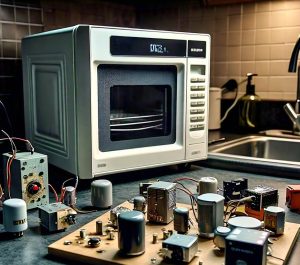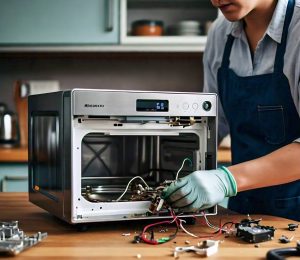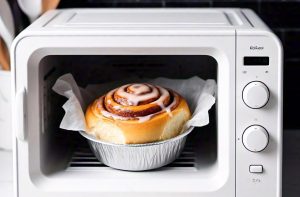A microwave is a common kitchen appliance that utilizes electromagnetic waves to heat and cook food quickly.
The question here is whether you can scrap it or not when it becomes dysfunctional or outdated.
In this article, we will delve deep into the topic of scrapping microwaves; whether it’s possible, how one can do it safely and correctly, and the legalities surrounding this process. We’ll also discuss what components inside a microwave are valuable for scrapping, tips on how to remove them without harming oneself or damaging the parts themselves, alternatives to simply throwing away an old microwave unit and frequently asked questions about microwaving in general. To wrap up our discussion, we’ll give our final thoughts on the matter.
Check out where you can sell your microwave.

Jump To:
Is it Possible to Scrap a Microwave?
Yes, you can certainly scrap a microwave. Microwaves are primarily made of metal and consist of other valuable components such as copper wire and transformers, which makes them suitable for scrapping. However, it’s crucial to be careful while dismantling the device due to potential hazards like capacitors that may retain dangerous electrical charges even after being unplugged. Always remember, safety is paramount when dealing with any electronic appliance.
Check out where you can dispose of your microwave near you.
Facts About Scrapping a Microwave
Here, we will discuss the important things to note about scrapping a microwave.
- Type of Material: Microwaves are made predominantly out of metal, plastic and glass which can be separated and recycled.
- Hazardous Components: They contain some hazardous materials including beryllium oxide in ceramic parts which is harmful if inhaled.
- E-Waste: Because microwaves are electronic devices they fall under e-waste when being discarded.
- Copper Yoke: This valuable component within your microwave can be sold separately for scrap.
- Microwave Capacitor: A capacitor inside the microwave holds electricity even after unplugging. It should be discharged properly before handling.
In conclusion, scrapping a microwave needs precautions due to certain hazards involved.
Now that this aspect has been covered thoroughly, let’s move into other discussions related to the topic.
What are the Alternatives to Scrapping a Microwave?
When you want to dispose of a microwave, there are several alternatives to scrapping it. These include donating the microwave if it’s still in working condition or recycling it through an electronics recycling program. Some people also choose to sell old appliances for parts or even repurpose them into something new and unique.
Check out how long a microwave can run.
Tips to Scrap a Microwave
While it is not recommended nor safe to operate one microwave within another, here are five general tips for safely using a kitchen’s most versatile appliance:
- Maintain your oven by cleaning spills as soon as they occur.
- Avoid using metal containers or utensils in order not to cause sparks or damage to the interior.
- Cover food with a suitable lid or vented plastic wrap, which can prevent splatters thereby keeping your oven cleaner longer.
- Rotate and stir food occasionally during cooking for even distribution of heat throughout the dish.
- Last but not least, always read and follow manufacturer instructions concerning use and safety precautions when operating any home appliance including microwaves.
In conclusion, while you cannot directly scrap or place one microwave inside another for operational purposes due to its inherent risks and inefficiency, there exist safer methods such as donation and recycling when considering disposal options along with actionable steps that ensure optimal usage over time.
Now we will discuss FAQs in the next section.

Frequently Asked Questions (FAQs)
In this section, we will now look at the most commonly asked questions related to microwaving and heating.
Can you scrap a microwave?
Yes, a microwave can be scrapped. Many components within a microwave such as metals and electronic parts are recyclable. However, it should be done by professionals due to the presence of potentially harmful materials. It’s important not to simply dispose of them as regular waste considering their environmental impact.
Is it safe to heat food in the microwave?
Absolutely, it is safe to heat food in the microwave provided that you use appropriate containers that are marked safe for microwave use. Microwaves heat food efficiently without altering its nutritional value significantly which makes them convenient for quick meal preparation.
Can all types of glassware be used in the microwave?
No, not all types of glassware can be used in a microwave. Only those labeled as “microwave-safe” should be used for heating or cooking inside a microwave oven because some glass products may contain lead or other harmful substances that get heated excessively causing potential hazards.
Does a higher wattage microwave heat faster?
Indeed, microwaves with higher wattage do heat faster than those with lesser wattage. The greater the energy output denoted in watts (W), the quicker is the ability of the appliance to cook or reheat food items providing more efficiency and saving time.
We hope these answers have addressed your queries effectively about microwaving and heating practices.
Final Word
To conclude our discussion on microwaving and heating: they provide an efficient method of quickly reheating meals while retaining most nutritional values when done correctly. It’s crucial to use microwave-safe containers and understand your appliance’s wattage for best results. Always remember, when it comes to disposing of old microwaves – scrapping is an option but should be performed by professionals due to potential environmental hazards.



